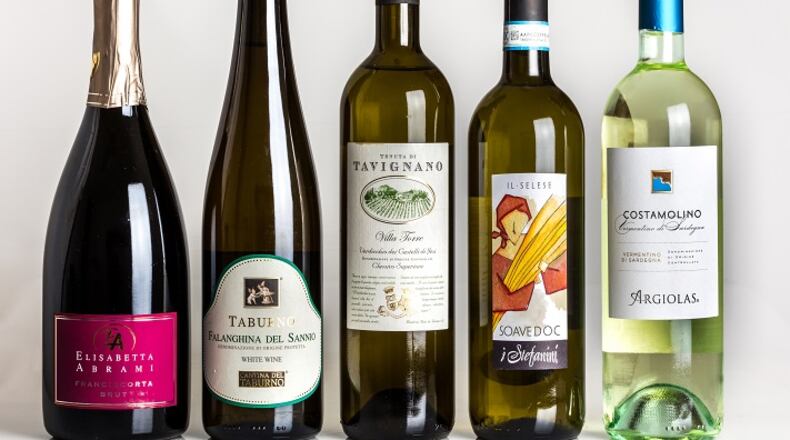Springtime always refreshes my curiosity and ignites my wanderlust. Not that I drop everything and hit the road, but I start rummaging through my wines looking for something different to quench my thirst. No more bold, warming reds or full-bodied whites. I want something light, something different. And that often means something from Italy.
Traveling up and down the boot courtesy of my corkscrew gives me opportunities to taste an amazing variety of wines - red, white or sparkling. Italy has more wine grape varieties than does any other country, and for some reason, many of them have not been successfully grown elsewhere. Ian d'Agata, in his superb reference book, "Native Wine Grapes of Italy" (University of California Press, 2014), counts 377 varieties he describes as "native," meaning they originated there or are identified almost exclusively with Italy. Some may have been carried westward by the ancient Greeks or Phoenicians, but over the centuries they have thrived in Italy but not elsewhere, qualifying them as native in d'Agata's reckoning. The number is almost certainly fluid as DNA recognition of grape varieties improves; some varieties may yet be identified as an Italian name for a well-known foreign grape. But consider this: There are nearly 1,400 wine grape varieties grown worldwide, according to the most authoritative book on the subject, "Wine Grapes," by Jancis Robinson, Julia Harding and José Vouillamoz (Harper Collins, 2012). If d'Agata's count is correct, more than a quarter of the world's wine grape varieties are Italian.
That gives Italian vintners a lot to play with.
"The trump card for Italian wine producers is their potential to make world-class wines that exhibit aroma and flavor profiles altogether different from those well known to the wine-buying public," d'Agata writes. "In other words, Italy's native grapes and wines offer jaded wine-loving consumers something new and interesting, at times even something wild and wacky. These wines are every sommelier's dream: delicious, food-friendly alternatives to the all-too-often overly alcoholic, oaky, tropical-fruit, or chocolate bombs that can be some chardonnays and cabernet sauvignons."
Italian white wine varieties are especially fascinating. Unfortunately, ask consumers to name an Italian white wine and most would probably think of pinot grigio, which translates into plain English as "boring." (There are exceptions, of course. Look for pinot grigio from the mountain vineyards of Alto Aldige in northern Italy. But pinot grigio is just the Italian name for the French pinot gris.) A little sleuthing in finer wine shops will uncover some delicious and exotic gems ideally suited for the lighter cuisine we tend to favor in warmer weather.
Piemonte, the region of robust Barolo and Barbaresco reds from the nebbiolo grape, counters with a racy, delicately floral white wine called Roero d'Arneis. Garganega may be Italy's stealth white: The grape's name rarely appears on labels, but it plays top fiddle as the grape of Soave from the region around Venice.
In the Marche, verdicchio produces a medium-bodied, earthy white with a floral note echoing Riesling and an appealing bitter-almond flavor on the finish. Falanghina, from the region where mozzarella reigns supreme, is an ideal partner for caprese salad or pizza margherita.
Let's not forget the islands. Sicily's grillo is terrific with seafood seasoned with olives and capers. And Sardinia's vermentino seems to capture the essence of the Mediterranean. Its citrus and sometimes tropical flavors are accented by herbal notes of wild sage, rosemary and thyme, plus a salinity that suggests the sea breeze cooling the island vineyards.
Italy can help us celebrate life's victories with bubbles, of course. Prosecco is a soft, enjoyable and affordable fizz unencumbered by the luxurious prices and expectations of champagne, while Franciacorta, made in the Champagne style, lends sophistication.
Let the wine travels begin.
---
McIntyre blogs at dmwineline.com. On Twitter: @dmwine.
About the Author
The Latest
Featured


